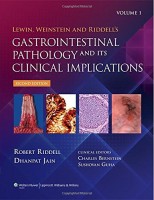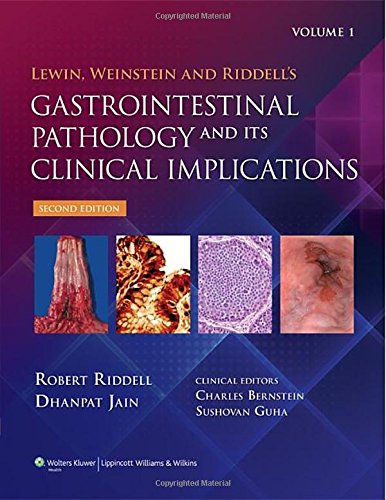 Editors: Robert Riddell. MD and Dhanpat Jain, MD
Editors: Robert Riddell. MD and Dhanpat Jain, MD
Clinical Editors: Charles Bernstein, MD and Sushovan Guha, MD
Publisher: Wolters Kluwer | Lippincott, Williams & Wilkins – 1,547 pages (Volumes 1 and 2)
Book Review by: Nano Khilnani
A lot of knowledge has been discovered since the first edition of this book was published 22 years ago in 2013. This second edition contains that new information, along with deeper insight developed by its authors since then. It can be used as a resource on a daily basis for challenging diagnoses, when encountering an unfamiliar lesion or disorder, or when guidelines are not available for some difficult issues.
Drs. Robert Riddell and Dhanpat Jain candidly state that while pathologists must understand the clinical implications of their diagnoses, when and where to biopsy, and what questions to ask, there are questions that simply cannot be answered by pathology.
Twelve specialists in gastroenterology, hepatology, pathology, and related medical fields – from the United States, Belgium, Canada, Germany, and Japan – authored the 21 chapters of this book organized in two volumes. Here is the coverage of the range of subjects:
- Volume I
- Dialogue, Biopsies – Taking and Handling; Resected Specimens; Protocols
- Vascular Disorders and Related Diseases
- Immunodeficiency Disorders
- Lymphoproliferative Disorders of the Gastrointestinal Tract
- Disorders of Endocrine Cells
- Motility Disorders
- Mesenchymal Tumors
- Gastrointestinal Manifestations of Extraintestinal Disorders and Systemic Disease
- Esophagus: Normal Structures, Developmental Abnormalities, and Miscellaneous Disorders
- Inflammatory Disorders of the Esophagus: Reflux and Nonreflux Types
- Polyps and Tumors of the Esophagus
- Stomach: Normal Structures and Developmental Abnormalities
- Stomach and Proximal Duodenum: Inflammatory and Miscellaneous Disorders
- Gastric Epithelial Polyps and Tumors
- Volume II
- Appendix
- Small and Large Bowel Structure: Developmental and Mechanical Disorders
- Small Bowel Mucosal Disease
- Inflammatory Bowel D8iseases
- Enteric Infections and Associated Diseases
- Small and Large Bowel Polyps and Tumors
- The Anal Canal
The entire contents of the print edition are available for download as an eBook. Follow these simple steps:
- Go to http://solution.lww.com/access
- Enter the Access Code found on the inside front cover of this book
- Enter your information, click Submit, and follow the on-screen instructions to start reading your eBook
Your book purchase includes not only a complimentary download of the enhanced eBook for iOS, Android, PC and Mac, but also includes these features:
- Complete content with enhanced navigation
- Powerful search tools and smart navigation cross-links that pull results from content in the book, your notes, and even the web
- Cross-linked pages, references, and more for easy navigation
- Highlighting tool for easier reference of key content throughout the text
- Ability to take and share notes with friends and colleagues
- Quick reference tabbing to save your favorite content for future use
One of the many good values of this book is the detailed outline provided at the beginning of each chapter. At a single glance, you the practitioner, researcher, medical resident or student can see what is or is not covered in a given chapter.
Let’s take a look at what topics are covered and how they are presented and discussed in chapter 2, Vascular Disorders and Related Diseases. Under each topic are various subtopics, but let’s see an overview of the topics covered in this chapter:
- Vascularization of the Digestive Tract – Overview
- Vascularization of the Specific Segment of the Digestive Tract
- Ischemia of the Gastrointestinal Tract
- Inflammatory Vascular Disorders of the Gastrointestinal Tract (Vasculitides)
- Mechanical Obstruction and Ischemia of the Digestive Tract
- Iatrogenic Disorders of the Vascular System
- Vascular Abnormalities of the Gastrointestinal Tract
- Handling of Specimens
Another of the many values of this book is the detailed information presented in tabular form: for example, Table 2-1, Causes of Acute and Chronic Mesenteric Ischemia. Outlined under Nonocclusive and Occlusive labels, the causes are numerous, perhaps contrary to an average student’s expectations.
In the Occlusive category for example, 24 causes are enumerated, ranging from carcinogenic, cardiac, cholesterol-related, degenerative, endocrine, fibromuscular, intestinal, radiation, trauma-related, and vascular causes, to name a few.
Real-life photos of diseased areas of the gastrointestinal tract and biopsy specimens are a third value of this outstanding book gastrointestinal pathology. On page 39 (in chapter 2) for example, five images are presented (Figures 2-6: A.B,C,D; and 2-7) of which four are actual photos and a fifth is a scan in color.
Figure 2-6 – Focal segmental infarction of ileum:
A: (Photo): Intense congestion and hemorrhage of the loop of bowel and the attached mesentery
B: (Photo): Opened ileum showing the intense purple discoloration of the mucosa: hemorrhagic enterocolitis
C: (Photo): Autopsy specimen of small bowel showing diffuse purple discoloration: serosa is uninvolved
D: (Scan): Full thickness section of intestine showing mucosal hemorrhage and submucosal congestion of vessels
Figure 2-7 – Segmental infarction of the terminal ileum showing a large mucosal ulceration. The demarcation between normal and involved segment is fairly sharp in the arterial lesions as seen here.
Editors:
Robert Riddell. MD, FRCPath, FRCPC is Professor of Laboratory Medicine and Pathobiology at University of Toronto Mount Sinai Hospital in Toronto, Ontario, Canada.
Dhanpat Jain, MD is Professor of Pathology and Director of the Program in Gastrointestinal and Liver Pathology in the Department of Pathology at Yale University School of Medicine in New Haven, Connecticut.
Clinical Editors:
Charles N. Bernstein, MD is Professor of Medicine, Head of the Section on Gastroenterology, Director of the IBD Clinical and Research Centre, and Bingham Chair in Gastroenterology at University of Manitoba in Winnipeg, Manitoba, Canada.
Sushovan Guha, MD is Associate Professor and Director of Research in the Division of Gastroenterology, Hepatology and Nutrition in the Department of Internal Medicine at University of Texas Medical School and Health Science Center in Houston, Texas.
Contributors:
Henry D. Appelman, MD
Charles N. Bernstein, MD
Hala El-Zimaity, MD, MS (Epidemiology)
Karel Geboes, MD, PhD, AGAF
Joel Kasle Greenson, MD
Sushovan Guha, MD, PhD
Dhanpat Jain, MD
Richard Kirsch, MBChB, PhD, FRCPath (SA), FRCPC
Hiroyoshi Ota, MD, PhD
Robert Riddell, MD, FRCPath, FRCPC
Masanori Tanaka, MD
Michael Vieth, Dr. med habil, Dr. med







